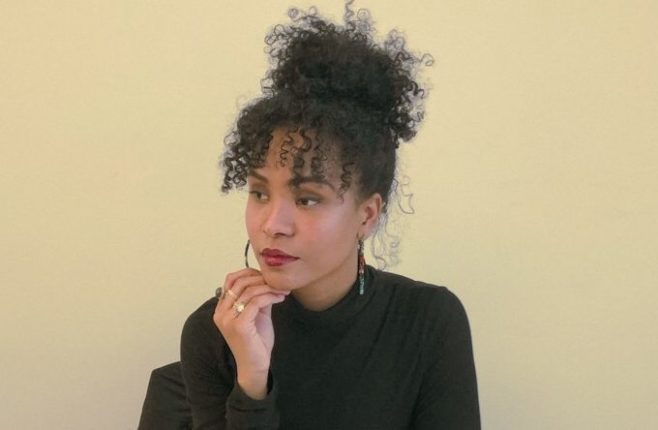News Details
Toward Equitable Education for All: MSSP Student Channels Social Policy Theory into Social Good

Authored by: Alina Ladyzhensky
Photography by: Myles Cream
Student Life
02/12/19
For Alice Cooper, an MSSP (Master of Science in Social Policy Program) student at Penn’s School of Social Policy & Practice (SP2), social policy theory and practice are inextricably linked.
Cooper earned her B.A. in Political Science and French Cultural Studies at Rutgers University, where she first became interested in studying the philosophical aspects of politics. Through several internships at the United Nations, she participated in working meetings with diplomats, CEOs of nongovernmental organizations, and international community organizers. After graduation, Cooper interned at the World Affairs Council of Philadelphia, where she helped organize events that focused on issues of social policy in an international context. Soon, her scholarly attention turned to fusing theory with practice.
“After we’ve spent all this time theorizing and discussing issues that are important to us, how do we demonstrate our ideas in our practice?” Cooper said. “That’s what first drew me to the MSSP program. While I might be able to fill in the holes for what I see as wrong or insufficient, it really comes down to: what are we going to do to manifest a sustainable resolution?”
In the MSSP program, Cooper’s interests are primarily situated in the areas of education policy and curriculum-making. She is especially concerned with cultural competence as it relates to teaching, framing curriculum to account for marginal communities’ perspectives and attitudes towards education, and implementing more intersectional approaches in curricula early on.
“While laws regarding education are obviously student-centered, there also needs to be a shift of focus to teachers and families. I’ve been looking at the Every Student Succeeds Act in-depth. As the nation’s main education law, it’s supposed to account for the most marginalized students—students of color who are coming from low economic status, students with limited English abilities, disabled students, and so on,” Cooper said. “If we want to care for the most marginal students, we need to focus on what they specifically need, as that varies by state— and, increasingly, according to localized districts.”
In Cooper’s view, part of this needed shift requires organizing with teachers to make sure they receive sufficient and ongoing training, as well as equipping educators with adequate resources. She has witnessed the implications of an under-resourced school district firsthand in her hometown of Pennsauken, New Jersey.
“I’ve sat down with families who complain that there isn’t a single room in the entire school district— not even a hallway— that is fully dedicated to students in need of special education. These students have to travel anywhere from 20 to 40 minutes outside of their hometown to a neighboring community that has more resources,” she explained. “Then, when they arrive to these communities with acclaimed learning institutions, maybe the teachers aren’t prepared to deal with or address the implications that may come with being a disabled student of color from a low socioeconomic status.”
“It is important and fair,” Cooper continued, “for every student to know early on that they have higher educational pursuits as a choice, and that the scope of their professions isn’t limited by the often-lowered expectations of their zip codes, or test scores that can never adequately reflect their creativity, resourcefulness, leadership, and innovation skills.”
Outside of her SP2 coursework, Cooper takes an actionable approach to her research concerns through leading events and network-building efforts throughout the greater Philadelphia area. She works with trustee members and teachers at local high schools to set up day-long events for students around topics such as college and career preparation, and pointedly bridges this work via local community outreach.
“We hold panel discussions or career simulations with community leaders so that students can ask questions, find trajectories and see themselves within certain careers, and figure out whether they want to go to college. In the meantime, professional contacts are created and community trust is instilled,” Cooper said.
Cooper’s time in the MSSP program has enabled her to enrich and further develop her intersectional thinking around issues of education policy and social justice.
“There are a few other students in my cohort who are also focused on education policy, some of whom are educators themselves, or international students. They’re considering changes I haven’t thought of, based on their own experiences. Seeing their different policy suggestions only reaffirms how interconnected struggles are,” Cooper explained. “It helps you build upon your own framework and become more inclusive in your thinking. I really appreciate the open dialogue that we’re able to have— to not only see other policy issues and areas of social justice in need of attention, but also the intersecting dynamic within our own interests.”
Looking ahead, Cooper sees herself continuing to make an impact on education reform through networking and event-planning, and she also endeavors to travel widely as part of a concerted effort to integrate her experience of being a first-generation student with her approach of maintaining accountability for different perspectives outside of Westernized norms.
As well, Cooper looks forward to experiencing one of SP2’s global course offerings, “Whose Colony? Politics, Identity and Social Policy in Revolutionary Cuba,” which takes place in Havana.
“Focusing on issues of international importance reveals the gray areas of privilege in which we’ve remained complicit. While we may not be able to account for every marginalized individual in one sweep, the continued understanding that these systems of oppression are always intertwined influences more humane compassion in our practice.”